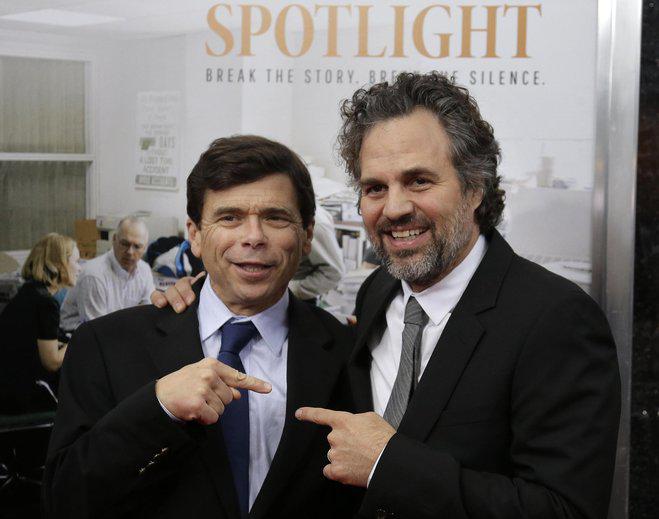The best lessons about how journalists work come from seeing them in action. And no film ever has done a better job of showing reporters and editors in their "watchdog" role, digging out important news others want kept secret, than "Spotlight."
The film tells the story of four members of The Boston Globe's investigative unit, the Spotlight Team, and what happens after the Globe's editor, on his first day on the job in 2001, has them look into the case of a defrocked Roman Catholic priest who had been repeatedly accused of sexually abusing children in his care. This leads them to investigate whether church leaders in Boston knew about the abuse by that priest and by others — and protected them by transferring them to new parishes, where they were free to harm other children.
Because the Globe did its job so well — eventually documenting shockingly widespread abuses by priests and the coverup by the Boston Archdiocese of a pervasive problem — "Spotlight" offers many lessons about the way news organizations can have a positive impact in their communities and beyond. (The Globe won the Pulitzer Prize for public service in 2003 for this work.)
The movie's biggest lesson is that bringing about significant societal change requires courage, risk-taking, and a willingness to upset powerful people and institutions.
This process begins on July 30, 2001, when Martin Baron, recently arrived in Boston, leads his first news meeting as editor of the Globe.
That meeting feels a bit like the first day of school. Lower-ranking editors nervously listen as an unfamiliar leader at the front of the room introduces himself and asks them to describe what their reporters are working on. Then Baron mentions a recent Globe column about a lawsuit against a defrocked priest in which the documents had been "sealed" (made private by a court order). When he proposes a legal challenge to the seal — sure to be opposed by the powerful church leadership — there's both excitement and uneasiness in the room.
Soon, Spotlight Team members begin to collaborate in ways that exemplify the standards of quality journalism: verifying and documenting information, providing context for their readers, and assuring that what they write is comprehensive, accurate and fair.
Verification and documentation: Not long after that news meeting, Spotlight Team leader Walter "Robby" Robinson (portrayed by Michael Keaton) begins what he calls "prospecting" the story. He makes assignments and edits the work of the other three members while reporting on his own.
The reporters first review what the Globe has published over the years about allegations that priests had sexually molested young people and how the archdiocese dealt with those cases. They don't find much: When accusations were made against priests, church leaders settled most cases out of court, quietly and privately. In the few instances where lawsuits had been filed, the archdiocese used legal means to get details sealed, denying the public access to the documents and knowledge of what happened.
Meanwhile, Baron (Liev Schreiber) obtains approval from the paper's publisher to appeal the court's sealing of the documents.
Spotlight reporter Michael Rezendes (Mark Ruffalo) talks to lawyers who have represented alleged victims of priests, and asks to interview their clients. Teammate Sacha Pfeiffer (Rachel McAdams) interviews the few whose names are public, and computer-data specialist Matt Carroll (Brian D'Arcy James) fills a spreadsheet with information about priests who had been accused of molestation. Information in the spreadsheet helps the reporters trace the priests' career paths and suggests a pattern: Church leaders are shuttling clergymen from parish to parish rather than addressing child-abuse charges. This leads the team to widen its investigation.
However, it quickly becomes clear that the team needs access to the documents sealed by the court if they want to say with certainty that church leaders knew of the abuse — and describe how those leaders dealt with the abusers.
Context: A critical moment in "Spotlight" comes when Baron describes three ways the Globe could frame the story: concentrating on the one priest who has been in the news; telling the story of the larger number of priests that their reporting has identified as abusers (though with less detail); or focusing on the Roman Catholic Church, and its Boston leadership, as an "institution." Before the team chooses that third way, he explains that only by proving the church leaders' knowledge of the priests' grievous misconduct on a wide scale can things be changed.
News organizations routinely make such decisions about how to frame the information in their investigations produce. As "Spotlight" shows, such choices dramatically shape both the story and its impact.
The Globe's decision means more reporting is needed, and the reporters must meet a higher threshold of verification — with extensive investigation of how the church treated abusive priests — before publishing. Those appear on Jan. 6 and Jan. 7, 2002, five months after Baron's first Globe news meeting.
Movies — unless they are documentaries — invariably invent dialogue, change facts and create their own time frame. That's true of "Spotlight," too, even if it achieves an unusually high level of authenticity. By ending with the publication of the paper's initial report, for example, "Spotlight" makes only a passing mention of the more than 600 articles that followed as the Spotlight Team doubled in size.
But what "Spotlight" clearly gets right is high-stakes watchdog reporting and the practices, values and standards behind it.
Roy J. Harris Jr., a former Wall Street Journal reporter, is the author of "Pulitzer's Gold: A Century of Public Service Journalism."
